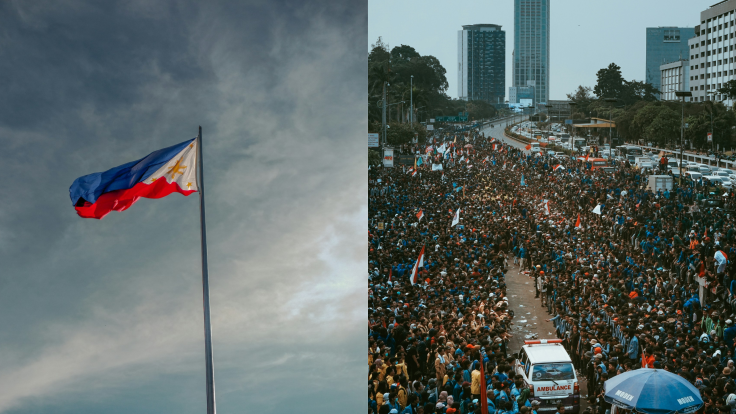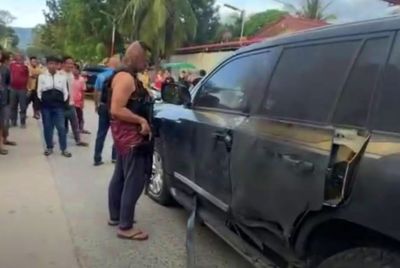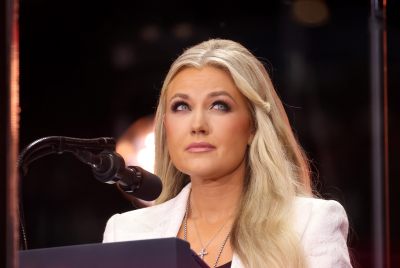#Corruption: Filipinos Praise Indonesia for Revolting Against the Government — 'If They Can, We Can Too'
Will Filipinos also do the same?

Indonesia has been hit by violent and deadly protests since late August 2025. These protests erupted after revelations of government corruption and excessive perks for lawmakers.
At least seven people have lost their lives, with hundreds injured and vast property damage reported. Meanwhile, many Filipinos are praising Indonesians for their boldness in opposing a corrupt government.
Across social media and public forums in the Philippines, voices express solidarity and urge action with sentiments such as 'if they can, we can too.'
This growing admiration reflects shared frustrations over corruption and political mismanagement in the Philippines.
Filipinos Praise Indonesia's Revolts
Filipinos widely admire Indonesians for standing up to their government despite the dangers involved. The courage shown by Indonesians sparks hope in the Philippines, a nation also struggling with systemic corruption.
@seren.ish If Indonesia can, the Philippines can too! ang bigat isipin na billions ang ginastos for flood control projects pero hanggang ngayon, binabaha pa rin tayo. Hindi ulan ang problema, it’s corruption. Ghost projects, ghost contractors, pero yung pera natin, hindi ghost. Totoo. Hard-earned taxes ng mga tao ang nawawala. The sad part is, habang yung mga tao nagdurusa sa baha, may mga officials and contractors na nakikinabang. They live comfortably while ordinary Filipinos lose their homes, their income, and their safety. That’s not just unfair, that’s theft. Corruption is not just a word we hear on the news. It’s the reason why our communities suffer, why development is so slow, and why people keep struggling. Pera ng bayan na dapat sana sa tao, nauuwi sa bulsa ng iilan. Kung mananahimik tayo, this cycle will never end. We need to call it out, we need accountability, and we need real action. Kasi at the end of the day, hindi ulan ang lumulunod sa atin. It’s corruption. #stopcorruption #parasabayan #floodcontrolproject #fyp #philippines
♬ original sound - swag - giselle
On TikTok, Twitter, and other social media platforms, many Philippine residents are encouraging their fellowmen to follow Indonesia's lead and revolt against the corrupt officials.
'If Indonesia can, the Philippines can too!' said a Filipino TikTok user.
@itsjvsh While the people struggle to survive, corrupt officials thrive. #StopCorruption #fyp #fypシ゚viral #flood #philippines
♬ som original - L'
According to ABC News, numerous public figures, including civic groups and religious leaders, highlight Indonesia's protests as a catalyst to 'expose injustice' and 'make corruption shameful again.'
This wave of support arises from years of frustration with deep-rooted graft in Philippine institutions, inspiring discussions on whether Filipinos might muster similar resolve.
What's Happening in Indonesia?
The protests began after news broke that Indonesian lawmakers were receiving a housing allowance of 50 million rupiah (£2,269) per month, as per CBC. This figure nearly tenfolds Jakarta's minimum wage.
Public outrage escalated when 21-year-old ride-hailing driver Affan Kurniawan died after being run over by an armoured police vehicle during a demonstration. Since then, violent clashes have erupted nationwide.
#Indonesia: We are following closely the spate of violence in the context of nationwide protests over parliamentary allowances, austerity measures, and alleged use of unnecessary or disproportionate force by security forces. We stress the importance of dialogue to address the… pic.twitter.com/r3KUfVQdIY
— UN Human Rights (@UNHumanRights) September 1, 2025
Rioters have set fire to regional parliament buildings, police stations, and vehicles. At least seven deaths have been confirmed, including a student killed during protests and a man beaten to death when mistaken for police intelligence. Over 460 injuries, with many hospitalised, have been recorded.
Indonesian President Fights Back Against Protesters
Indonesian President Prabowo Subianto imposed strict measures against the rioters. He labelled some actions as potentially treasonous or terrorist and cancelled a planned visit to China amid unrest.
'There are signs of unlawful acts, even leading to treason and terrorism,' said Subianto.
The Indonesian leader added: 'To the police and the military, I have ordered them to take action as firm as possible against the destruction of public facilities, looting at homes of individuals and economic centres.'
Protest tonight in front of the Embassy of Indonesia in Kuala Lumpur, Malaysia. pic.twitter.com/xiVZRCadZH
— Vincentius Azvian (@vincentazvian) September 2, 2025
The president promised to reduce lawmakers' perks, suspend overseas trips, and provide support for victims' families. He urged calm and peaceful expression of grievances.
Despite these promises, many Indonesians remain skeptical about meaningful reforms or economic improvements.
Worsening Corruption in the Philippines
Meanwhile, in the Philippines, corruption scandals worsen, especially tied to flood control projects. On 2 September 2025, President Ferdinand Marcos Jr. and Congress opened investigations into alleged widespread graft.
Officials and construction firms face accusations of involvement in 'ghost projects' and substandard flood defences. The House Infrastructure Committee held televised hearings while the Senate Blue Ribbon Committee grilled contractors suspected of fraud.
The flood control budget exceeds 308 billion pesos (over £4 million), raising fears of corruption at an unprecedented scale. Rep. Elijah San Fernando described the scandal as 'of the grandest kind'. Millions of Filipinos remain vulnerable to flooding, worsened by these failures, especially after recent typhoons.
President Marcos announced plans for an independent commission to investigate and file charges. One controversial contractor, Sarah Discaya, came under scrutiny for owning 28 luxury cars while denying corruption allegations.
Philippine senators expressed alarm over the corruption's impact on ordinary citizens rather than the country's elites. Catholic Church leader Cardinal Pablo Virgilio David urged young Filipinos to fight corruption actively by exposing injustice and shaming graft openly.
Will Filipinos Also Revolt?
The Philippines has a history rich with revolutions against oppressive and corrupt rule. The most notable was the 1896–1898 Philippine Revolution that ended Spanish colonial domination.
Leaders like Jose Rizal, Andres Bonifacio, and Emilio Aguinaldo led a nationalist fight despite great risks. These movements showed the capacity of Filipinos to unite for freedom and justice.
However, today's realities pose challenges for a new revolution. Entrenched political patronage, powerful elites, fear of government crackdowns, and widespread political apathy hinder mass mobilisation.
Many fear violent repression or legal consequences for dissent. Aside from these, most Filipinos are focused on their jobs, finding ways to provide for their families, and overcoming public transportation issues just to survive each day.
Yet, Indonesia's ongoing protests raise questions about Filipinos' willingness and ability to revolt amid similar corruption and economic difficulties.
Public discourse increasingly asks, 'If Indonesians can rise despite risks, why can't we?' While others lack the courage and means to revolt against the worsening corruption, others are not giving up. Some are even preparing their own protests. One of these is said to happen on 13 September 2025 in Edsa, Quezon City.
The inspiration is clear, but the path forward remains uncertain amid the Philippines' complex political landscape.
© Copyright IBTimes 2025. All rights reserved.





















